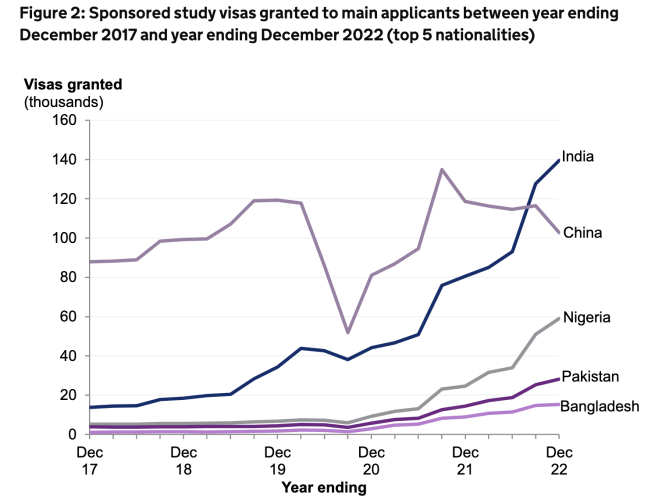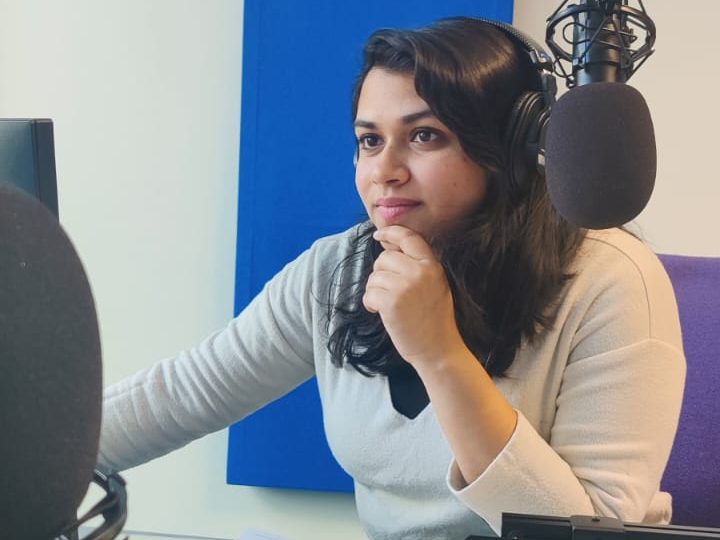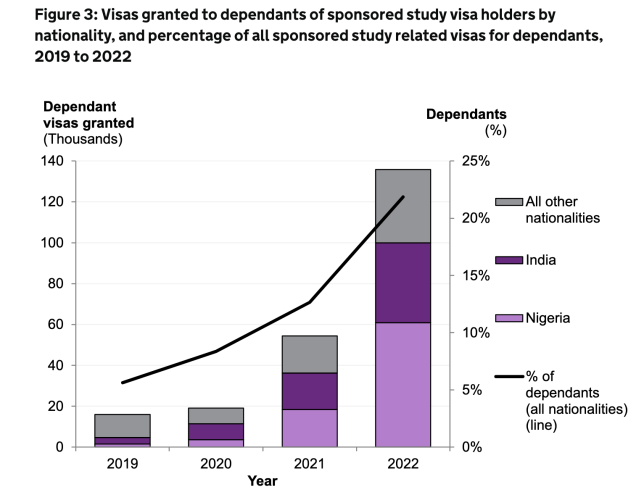India has had a long, rich, and illustrious history of migration. The country’s young and able-bodied population, packing up suitcases full of their belongings along with a few bottles of homemade pickles and venturing out into foreign lands in search of opportunities has long been an image popular in its cultural zeitgeist.
According to a 2020 United Nations migration report, around 18 million Indian citizens are dispersed around the globe- making India the world’s largest origin for international migrants.
With a population of 1.4 billion, an ultra-competitive domestic education industry and rising unemployment- it is no surprise that over 770,000 students left India for higher education in 2022.
The United Kingdom played host to 140,000 Indian students in 2022, according to the new figures released by the Office of National Statistics. The Home Office statistics indicate that Indian students make up over a quarter of all student visas issued in 2022.

Indian students aspiring to further their education overseas often turn their eyes towards English speaking countries like the US, Canada, Australia, and the UK. The UK, however, offers the added benefit of housing a thriving and vibrant Indian community, along with deep cultural ties with the nation. Students also prefer coming to the UK as post-graduate programmes are often cheaper and are less time-consuming compared to its counterparts.
‘Best moments of my life’

For Gaurav Kumar, 33, the UK was the first and only choice of country he considered studying in. The University of Leeds student said that the imperial history between India and UK meant that it was easier to understand and navigate through the country’s complex bureaucratic and social systems, as these were also inherited and adopted by his home country. He also holds an appreciation for the values English society and culture holds. “They deeply value fairness, order, and respect for each other.”
Kumar arrived in Leeds in September 2022, and said he has thoroughly enjoyed every aspect of university life as he was able to experience several things he would not be able to back home. For him, the perspectives gained, the diversity of his cohorts and the exchange of ideas he has been able to experience has culminated into what he called “the best moments of my life.”
Kumar wants to use the knowledge he gained during his degree in business analytics and decisions sciences to embark on a change in his career and hopes to work in the field on a post-study work visa.
23-year-old Jisha Ann Philip found that moving to the UK gave her the freedom and liberty to live life on her own terms. “The fact that I am able to work here as well as study has given me the freedom to make my own decisions and has made me more open to exploring new experiences,” said the Leeds-Beckett post-graduate student.

“There’s a social stigma towards working part-time in hospitality jobs in India, and the stigma is restricting. They’d say, ‘despite coming from a good house and being provided with everything by your family, why do you still want to work?’ I’m more independent here, I do my own chores, I take care of myself and I’m no longer dependent on my parents to provide anymore.”
Philip hopes her degree in public relations will lead to enriching work experiences but does not intend on staying long in the country as starting salaries for fresh graduates like her would not be sufficient to survive on considering the rising costs-of-living.
The dependents question
International students have also been placed in the middle of a heated immigration debate in the UK, with Tory governments since 2010 calling for a decrease in ‘net migration.’ Ahead of the 2022 Migration Status report that showed over 22% of all sponsored study visas were issued to dependents of the students, the UK government announced sweeping bans on overseas students bringing their family to the country.

For Indian students in the UK- majority of which are older post-graduates- the option to bring their partners and children along with them were the biggest draws to choose the UK as a higher education provider.

Pavneet Kaur, 27, began her post-graduate studies at Bournemouth University in January 2023 with a dream of furthering her career in software management after she felt her professional growth stagnating in India. But as newly married woman, she dreaded staying away from her husband. For her, the UK’s dependants’ visa provision was a saving grace. Her spouse Simranjeet Singh, 27, is her rock she said, providing her with the support to comfortably focus on her studies. “He supports me so much, if I were alone I’d always be emotional and depressed, I’d have to do everything on my own. He supports me financially as well as at home, doing chores and packing lunch to help me focus.”
She said she would not have moved to the UK if her husband had to stay behind.
“I really want to raise my family here, we want to find long-term jobs in our field, we really want to settle down here…. this is my dream country, my eyes were wet when my plane landed here,” Singh chimed in.
Inconsistent messaging
Amit Tiwari, co-founder and president of Indian National Students’ Association (INSA), credited the two-year long post-study graduate visa route introduced in 2019 for the sharp increase in the enrolment of Indian students.

According to Tiwari, political flip-flopping and inconsistencies with student immigration policies will only adversely affect UK university fundings and its economy- with a brunt of its effects falling on the taxpayers’ shoulders.
A London Economics report released in May indicated that international students in the 2021/22 academic year contributed £41.9 billion to the UK economy, with just 11 non-EU students contributing £1 million pounds worth of net economic impact.
Tiwari said that several Indian students have echoed feelings of being treated like ‘cash cows,’ after spending tens of thousands of pounds on a university education, only to arrive in the UK and be taught lessons online.
“India is a country of 1.4 billion, but most importantly, aspirational people… as far as Indian students are concerned, it’s a journey. Today it’s UK, tomorrow it will be some other country. The Indian student will take their money and go elsewhere.”
“The authorities need to wake up and smell the coffee before it’s too late,” said Tiwari.








